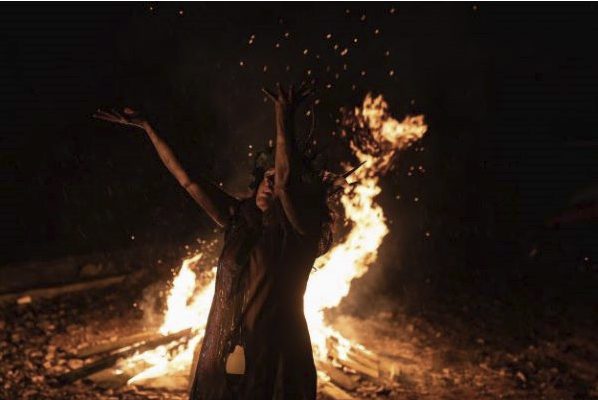In most small towns, there’s one house that the neighbourhood kids sprint past. The one residence said to be inhabited by the local bogeyman or witch, who’ll snatch children away. They’re mostly just misunderstood Boo Radley figures, or an isolated soul with a tragic past. But sometimes, there’s a little more to the legend. Sometimes there’s a dark event that has forced a virtual banishment from the town. And sometimes you get ‘Bloody’ Mary Laidlaw. Lynne Davison’s grimly atmospheric folk horror plays on small town superstition and long-standing myth to admirable effect. As a mystery it shows its hand a little too early, but it’s an impressive debut feature.
The notorious ‘Bloody’ Mary Laidlaw (Derbhle Crotty) is released back into society having served 20 years. No-nonsense probation officer Cathy Madden (Deirdre Mullins) is tasked with her rehabilitation. Cathy believes that no matter what Mary has done – and the crime is colourful to say the least – she’s served her time and deserves to serve her probation in peace. Most of the town folk are less willing to forgive, especially those that remember all too well the events of two decades ago. And then two children vanish. Fingers immediately point towards Mary. But she’s got an ankle tag that goes off when she leaves her property, and she’s not really a witch. So she couldn’t be involved, could she?
Mandrake‘s success hinges on two things; a great location, and a well-defined central tension between its principal characters. The setting is the kind of rural small town that has been left to decay in on itself, the kind of forsaken little place that has rotted entirely, and where the people left behind seek someone to blame. It also has the evocatively titled backwoods area known as ‘The Moss’, where dark deeds take place and children go missing. Mary is wistful about the Moss when Cathy meets her at her almost comically rundown shack which couldn’t be any more witchy if it was made from gingerbread. She had a son from a tryst she had in there in the loam and mud, but he was taken into care when she went to jail. Somehow, she also knows that the taciturn Cathy is not the primary care giver of her young son Luke (Belfast‘s Jude Hill). Her policeman ex-husband Jason (Paul Kennedy) is now married to a sweet woman who Luke now calls mummy. It’s a battle of wills straight away between the two mothers. Matt Harvey‘s script affords empathy to both, but to what extent both deserve it is a central moral question.
If Mandrake kept its central mystery more jealously guarded it would be a real gem. Instead, it soon settles a little too neatly into the resurgent folk horror format, with hints of something more prosaically grotesque like Don’t Torture a Duckling or Straw Dogs in its depiction of small-town hysteria. The drama around the missing children is extinguished a little quickly, and the rest of the story lurks in familiar territory from there. Although it’s a great example of the subgenre, it’s a shame that it sheds its ambiguity so soon, especially given how well it initially exploits the audience’s sympathy for the perceived outsider. On the plus side, it also remains thematically consistent throughout. The title refers to the eerily human baby-shaped root that is said to scream when ripped from the ground, causing madness or even death to those who hear it. This ties into the central theme of unorthodox motherhood as well as becoming an explicit element in the story, with properties that can kill or cure. It’s a neat way of bringing centuries-old myth into this new post-millennial strand of modern horror.
Despite some of its intensely-depicted early personality being jettisoned along the way, there is much to enjoy here. Punctuated with some startling imagery, and with two eccentric, complex characters played to the hilt by two very fine actresses at its heart, Mandrake is a very fine debut.
Screening as part of FrightFest at Glasgow Film Festival 2022
